Conferences

Daslne organises conferences in the North East, to bring together families and professionals to discuss topics and themes relevant to children with an autistic spectrum disorder:
Daslne Conference 2015 - Autism In Education
The Daslne Conference entitled “Autism in Education” took place on Wednesday, 7th October 2015 in the Research Beehive at Newcastle University.
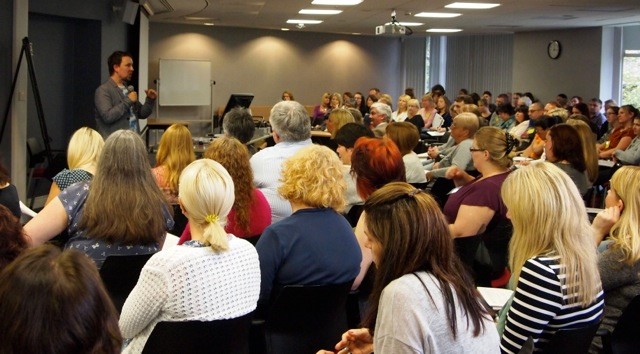
The programme for the day is available here:
Daslne Conference Programme 2015
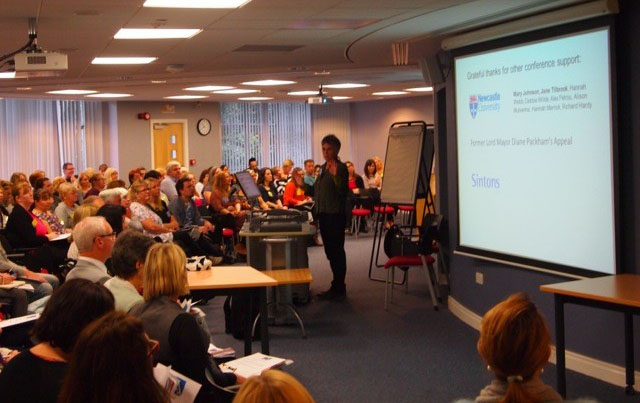
The Inroduction to the conference can be downloaded here:
Daslne 2015 Conference Introduction
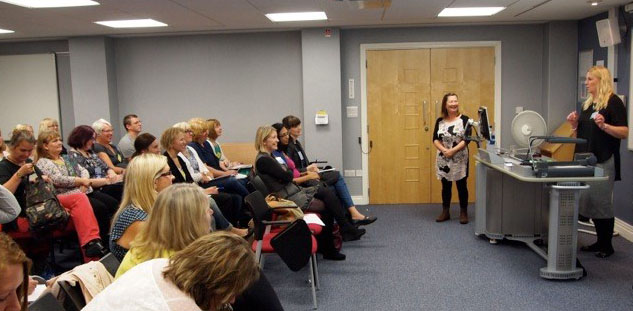
The Helping teachers to support children with autism in schools workshop presentation can be downloaded here:
Daslne 2015 Helping teachers to support children with autism in school
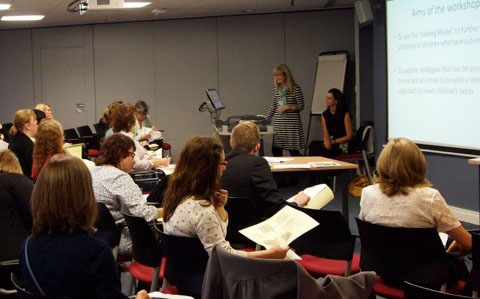
The Strategies to help young children with Autism Spectrum Disorder make sense of their world workshop presentation can be downloaded here:
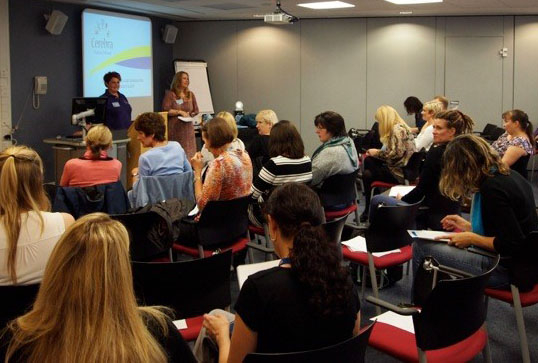
The Understanding and managing children's sleep wokshop presentations can be downloaded here:
Daslne 2015 Understanding and managing children's sleep
A big thank you to everyone that attended and helped make the day such a huge success!
We have prepared a Summary of the Evaluation Forms which can be downloaded here:-
Daslne 2015 - Summary of Evaluation
The Daslne Conference 2012 - Partners in Autism Research
Wednesday, 23rd May 2012 – The Great North Museum
The third Daslne Conference hosted 7 workshops on the following topics:-
Sleep difficulties in children with ASD: differences in how children respond to medical and behavioural management.Sleep
Decision-making and anxiety: experiments to help understand how children with autism think, and the links with anxiety. Decision Making and Anxiety Presentation
Feeding difficulties in children with ASD: development of a brief questionnaire to understand the range of feeding problems – supporting professionals and parents in the community.Feeding difficulties in children with ASD
Families’ opinions on genetic testing: findings from a large survey Families Opinions on Genetic Testing
Helping children to overcome anxiety: results from a pilot evaluation of group therapy for young people and parents. Helping Children to Overcome Anxiety BAT
Managing repetitive behaviours: a new course for parents has been developed for a controlled study of its impact. Managing Repetitive Behaviours
Early communication intervention: a national UK study of speech and language therapy treatment for preschool children.Early communication intervention
Main Conference

Coffee Break

Workshops

Daslne Conference 2009 - Searching For Answers
The second Daslne Conference focused on the essential contribution families make to autism research.
Amanda Allard, Principal Officer for the Council for Disabled Children, agreed to be the guest speaker at the Conference. Amanda has a great deal of experience of working with and for, disabled children and their families.
Thursday, 26th March 2009 in The Magpie Suite,
St James Park, Newcastle upon Tyne
10.00 am – 2.30 pm
Programme
9.30am Registration
10.00am Welcome and Introduction – Helen McConachie
Answers so far
10.10am A National Overview – Amanda Allard (Principal Officer – Council for Disabled Children
Amanda Allard, Principal Officer for the Council for Disabled Children, was the guest speaker at the Conference. Amanda has a great deal of experience of working with and for, disabled children and their families.
download N154 Leaflet – The Disabled Children’s Services Indicator (PDF)
10.50am Coffee

11.10am Why families join Daslne: Carmen McLeod
Carmen McLeod (number 700 on the Daslne database) spoke about the benefits of being involved with Daslne.
11.25am Why families take part in research studies
Carol Carey talked about her experiences of being involved in the Preschool Autism Communication Trial and the Test Foods Study.
11.40am Thousand Families – a 60 year study: Mark Pearce and Jean Taylor
Mark Pearce and Jean Taylor discussed the benefits of being involved in The Thousand Families Study.
12.00pm Daslne Anxiety Survey findings: Helen McConachie
Professor Helen McConachie gave a brief overview of the initial results from the Anxiety Survey (Presentation)
12.30pm Buffet Lunch
What questions do we want to ask?
1.15pm Workshop Sessions
As well as hearing from key speakers, parents and professionals discussed in small group settings what their priorities are for research and services. The topics discussed in the workshops were:

Fitness – Kath Dickinson
This workshop introduced recent research into the benefits of computer-aided fitness equipment and of swimming as exercise for young people with ASD. Discussion covered a range of issues about promoting fitness.
download Fitness using the Wii handout (Word)
download Swimming handout (Word)
Leisure – Deborah Garland
The workshop looked at leisure opportunities for young people with ASD and their families, both ASD-specific provision and strategies for inclusion in local community activities. Discussion centred on how to improve the quality of life for these young people.
download Lesiure handout (Word)
Sleep – Annette Hames
Information was presented on why children don’t sleep and strategies which seem successful in improving sleep patterns.
download sleep requirements handout (PDF)
download sleep progression handout (PDF)
Anxiety – Helen Taylor, Vicky Grahame
The workshop described a recent therapy group for anxiety, run with young people with ASD and their parents and introduced strategies that seem to work best for managing anxiety. Discussion covered what makes young people anxious and shared ideas on how to cope.
download Anxiety handout (Powerpoint)
Support for Parents – Tricia Thompson
The Carers’ Assessment was introduced, as a useful tool to access certain services, and to start debate about what services are most needed.
download Support for Parents handout (Word)
Assessment Pathways – Allan Colver
The National Autism Plan for Children was published in 2003, and a survey last year identified how far it has been implemented. The workshop discussed the essentials of an effective pathway for assessment and diagnosis.
2.15pm Priority Questions for Daslne
2.30pm Conference ends
Evaluation/Feedback
We were pleased that the conference was received very positively by the 105 participants (including speakers and workshop leaders). Of the 51 evaluation sheets returned, everyone seemed to have found some or every part of the day valuable, especially the afternoon workshops. Lots of parents asked for more workshops at the next conference!
| excellent | good | acceptable | below average | poor | |
|---|---|---|---|---|---|
| Overall | 44% | 52% | 4% | 0% | 0% |
| Venue | 57% | 35% | 8% | 0% | 0% |
| Catering | 69% | 21% | 10% | 0% | 0% |
| Booking | 71% | 27% | 2% | 0% | 0% |
| Organisation | 64% | 32% | 4% | 0% | 0% |
| Relevance | 25% | 67% | 8% | 0% | 0% |
General comments
- Good to have mix of professionals and parents in workshops
- Workshops excellent for sharing
- Parent speakers were great
- Keynote speaker a bit over my head
- As a teacher in adult education, it raised awareness of ASD
- Some parents could not get a place – can the conference be bigger?
What should we include in future Daslne conferences?
- More workshops
- Workshop topics suggested: provision for adults; developmental coordination disorder; emotions training; Asperger syndrome; anger management.
- Topics for speakers: education, eg how to choose the school most appropriate for your child; Information on appropriate interventions; continue the feedback on research.
- Several participants wanted more access to information: more information on help from local authorities; stalls about different services across NE; signposting to available services.
Please tell us one priority question you would like to have answered
Service questions
- How can families be supported through the assessment process, with a clearer pathway?
- How can you improve post-diagnosis support?
- Why are services offered so different across different areas?
- Will teachers receive more training in all issues regarding ASD?
Questions for Daslne
- How does Daslne data get fed into local areas to influence service planning?
- Two parents asked: How can we be involved in research?
- How can a broader ethnic mix of parents be included in the conference?
Questions for professionals
- How best to defuse anxiety?
- How to manage anxiety from a distance (ie. on the telephone)?
- Can a group be set up to teach children about themselves?
- How do I explain privacy to my son?
Research topics
- What are the sleep norms for people with ASD?
- What are the psychological effects on siblings of living with an individual with autism?
- How to improve social conversation skills in teenage boys?
- Causes of autism?
The Daslne Conference 2006 - Autism in the North East: Celebrating the first three years of Daslne
The Daslne conference shared the lessons learned in setting up this unique collaborative database. The conference also included presentation of the first sets of findings about our North East children with autism spectrum disorder.

Speakers included Jessica Peers, author of ‘Asparagus Dreams’, Helen McConachie, Director of Daslne, local parents, and Francine Bates, Chief Executive of Contact-a-Family. The conference day allowed discussion with all the partners of Daslne about the directions for the future.
Autism in the North East: Celebrating the first three years of Daslne
Conference , Monday March 20th 2006, Magpie Suite, St James Park, Newcastle,
Programme
9.30 Registration
Morning chair: Francine Bates, Contact a Family
10.00 Session 1: Celebration
Francine Bates opens the Conference.
Presentation about Daslne – Allan Colver & Anna Spencer
Parent speaker – Helen Geldard, County Durham Autism Support Group
11.15 Refreshments
11.30 Session 2: What can the database tell us?
What the data tell us about support needs – Helen McConachie
Problems and solutions – Jessica Peers, Sunderland, author of ’Asparagus Dreams’
Questions
12.45 Lunch
Afternoon chair: Ann Le Couteur, University of Newcastle
1.30 Session 3: How will Daslne contribute?
Contributors include:
Service development (Alice Oliver, North Tyneside Multiagency Assessment Pathway)
Research (Barbara Riddick, Northgate & Prudhoe Trust; Helen McConachie)
Voluntary Organisation: (Tricia Thompson, North Tyneside Learning Disabilities Federation)
First Impressions: Mike Tomkinson, Senior Education Officer, Northumberland
Questions to panel
2.45 Refreshments
3.00 Session 4: Future plans
How to sustain Daslne for next 20 years – Professor Louise Parker
- service planning
- research
4.00 Conference ends – Closing Remarks
Feedback on the conference (percentages)
| excellent | good | acceptable | below average | poor | |
|---|---|---|---|---|---|
| Overall | 46% | 51% | 3% | 0% | 0% |
| Venue | 56% | 30% | 12% | 2% | 0% |
| Catering | 54% | 38% | 6% | 2% | 0% |
| Booking | 58% | 40% | 2% | 0% | 1% |
| Oranisation | 66% | 34% | 0% | 0% | 0% |
| Relevance | 40% | 57% | 3% | 0% | 0% |
This summary of the feedback forms at the end of the conference is very pleasing, and a testament to the hard work of Mary Johnson, administrator, and our team of helpers.
What implications or benefits do you see for you or your organisation?
Examples of comments:
- Made me aware of the way Daslne information can be used
- The benefits to me as a parent were meeting key professionals in research into autism, the opportunity to share experience, and the access to information stands and bookstalls
- Was a good way to network with a wide range of professionals in my locality
- Daslne enables us to talk factually rather than just from personal impressions
- It’s good to know that Daslne will be able to support organisations with planning for my son’s future
What should we include in future Daslne conferences?
Examples of comments:
- Small parent and professional workshops to generate questions for the panel
- Workshops on those needs identified eg. behaviour management, sleep issues, eating problems, bullying etc
- Continue to include speakers who have ASD/have children with ASD, as this really gets the point across of how important the database is
- More detail on data collected and implications for practice
- Perhaps some sharing from each district on how Daslne has informed practice
- Local Authority plans for the future, for children, young people and adults with autism in their locality. How have they planned to budget for the increasing numbers of people with ASD?
- How to put pressure on statutory funders to provide basic services – health, education, children’s services, and for diagnosis
- Updates on research which has been facilitated by Daslne


